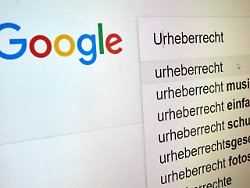Thursday, May 20, 2021
Controversial reform passed
Bundestag defies trouble about copyright
Germany must adapt its copyright to new digital realities in accordance with EU requirements. Shortly before the deadline expires, the Bundestag passes the reform. The effects on platform operators, authors and exploiters are great. Just like anger and worry.
The Bundestag passed the controversial reform of copyright law. With the votes of the black-red coalition, parliament cleared the way for the new rules for authors, press publishers, internet platform operators and users. The Greens abstained. AfD, Left and FDP voted against it. Germany must have implemented a corresponding EU directive on copyright into national law by June.
Among other things, the reform is about adapting the previous copyright rules to use on the Internet – primarily about platforms to which users can upload content. In the future, platform operators should be held liable if users upload copyrighted works such as images, texts or videos without permission and without license agreements. Federal Minister of Justice Christine Lambrecht announced: “The core of the reform is the copyright responsibility of upload platforms such as YouTube, Facebook or TikTok. In future, they will have to license creative content that is shared by users on the platforms.”
Concern for freedom of expression
The federal cabinet approved the draft law in February. Authors and creatives should be more involved in the creation of value on the Internet and their information obligations should improve. An ancillary copyright for press publishers is also provided for in the extensive legal reform.
Before the EU directive, there were massive protests and demonstrations in many countries years ago – Internet users feared restrictions through so-called upload filters and a restriction on freedom of expression if too much content is filtered out by the platforms before uploading. The federal government wanted to avoid such filters as much as possible – opposition politicians see these plans as a failure.
The project manager Julia Reda from the Society for Freedom Rights Association tweeted that cases of blocking legal content would be collected and, if necessary, sue. The protests on the street were almost non-existent when it was transposed into national law. At the same time, associations and organizations repeatedly vented their displeasure. There were also joint protest letter campaigns by musicians and artists. A thorn in the side of the music, media and film industry is a passage that allows short excerpts of copyrighted works such as sound, video or text to be uploaded to a platform without a license. Despite the criticism, the passage remained in the law. The economic sectors fear financial disadvantages for themselves and also for authors.
“Effective against the exploitation of journalistic content”
Publishers are satisfied with the ancillary copyright. The Federal Association of Digital Publishers and Newspaper Publishers (BDZV) and the Association of German Magazine Publishers (VDZ) welcomed the fact that there is now a protective right for journalistic content. “With the new ancillary copyright law and the rules that have been in force since January to restrict market abuse by large Internet companies, we will be able to effectively defend ourselves against the exploitation of journalistic content,” said the two associations. Appropriate participation in the profits that digital providers also achieve with the use of third-party editorial content is a crucial point for the future of digital journalism.
The Google boss for Central Europe, Philipp Justus, wrote in a blog entry for the group that they would work with German publishers to reach an agreement on an expanded preview of content that may be protected by the new law. “These negotiations are conducted on the basis of uniform criteria.”
Trade unionists were partly critical of the reform. The German Association of Journalists sees a shortcoming, for example, in the fact that there is no right to classify. Verdi sees authors and artists at a disadvantage compared to platforms and large publishers.
.
